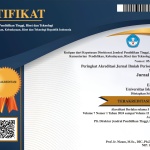When Favoritism Becomes a Crime: A Comparative Analysis of Nepotism in Anti-Corruption Enforcement
Abstract
Nepotism, as a form of favoritism, continues to pose a significant threat to public sector integrity, particularly in Indonesia where familial ties often influence appointments and resource allocation. This study aims to critically analyze the legal treatment of nepotism in Indonesia under Act No. 28 of 1999 and compare it with Australia’s approach through the common law and statutory offence of Misconduct in Public Office (MIPO). Using a normative legal research method, the study examines statutory texts, judicial precedents, and institutional practices in both countries. It highlights significant legal and institutional shortcomings in Indonesia’s framework, including vague definitions of key terms, lack of enforcement mechanisms, and the exclusion of nepotism cases from the jurisdiction of the Corruption Eradication Commission (KPK). The novelty of this research lies in its comparative analysis, extending beyond domestic critique by systematically contrasting Indonesia’s narrow and fragmented legal approach with Australia’s broader, enforceable, and institutionally supported anti-nepotism framework. The findings reveal that while Indonesia limits nepotism to material harm in public appointments and procurement, Australia criminalizes a wider range of misconduct through clearly defined laws enforced by independent anti-corruption commissions. This contrast underscores the need for Indonesia to reform its legal definitions, expand enforcement authority, and integrate anti-nepotism measures with broader governance reforms. The study concludes that strengthening Indonesia’s legal and institutional capacity, informed by Australia’s model, is essential to addressing nepotism as both a legal and governance challenge.
Keywords
Full Text:
PDFReferences
Journals:
Ali, S. (2019). Indonesian civil service management and corruption. Asia Pacific Fraud Journal, 4(1), 16–26. https://apfjournal.or.id/index.php/apf/article/view/94
Bramoullé, Y., & Goyal, S. (2016). Favoritism. Journal of Development Economics, 122, 16–27. https://doi.org/10.1016/j.jdeveco.2016.04.006
Gusman, D. (2024). The strong influence of nepotism on corruption on the buying of positions in the reason of government. Journal of Law, Politic and Humanities, 4(3), 239–246. https://doi.org/10.38035/jlph.v4i3.352
Hanif, S. F. (2022). Broaden the authority of the Corruption Criminal Act Courts in order to eradicate corruption, collusion and nepotism. Pandecta Research Law Journal, 17(1), 58–68. https://doi.org/10.15294/pandecta.v17i1.33036
Kristiana, Y., & Hutahayan, B. (2024). Judicial corruption in the post-reform era: Assessing the effectiveness of legal reforms in Indonesia. International Criminal Law Review, 1–22. https://doi.org/10.1163/15718123-bja10208
Loughnan, A. (2017). ‘The very foundations of any system of criminal justice’: Criminal responsibility in the Australian Model Criminal Code. International Journal for Crime, Justice and Social Democracy, 6(3), 8–24. https://doi.org/10.5204/ijcjsd.v6i3.420
Lusty, D. (2012). The meaning of dishonesty in Australia: Rejection and resurrection of the discredited Ghosh test. Criminal Law Journal, 36(5), 282–299.
McKeone, M. (2021). Public sector corruption and the corruption and crime commission. Brief, 48(6), 44–46. https://doi.org/10.3316/informit.366616674912661
Mowla, P. L. (2025). WHAT MAKES NEPOTISM WRONG? Journal of Ethics & Social Philosophy, 28(1), 98-136. https://doi.org/10.16556/jesp.v30i1.4326
Oroh, A. S. (2024). Tinjauan yuridis terhadap pelaporan harta kekayaan oleh penyelenggara negara menurut Undang–Undang Nomor 28 Tahun 1999. Lex Privatum, 14(1), 1–12.
Prenzler, T., & Ransley, J. (2023). Australia’s New National Anti-Corruption Commission: Background and Critique. Public Integrity, 26(5), 507–519. https://doi.org/10.1080/10999922.2023.2271684
Riyadi, B. Sl. (2024). The sociology law: Corruption and abuse of power in Indonesia. International Journal of Religion, 5(7), 599–613. https://doi.org/10.61707/64fp5z33
Tarrant, S. (2013). Building bridges in Australian criminal law: Codification and the common law. Monash University Law Review, 39(3), 838.
Umam, A. K., Whitehouse, G., Head, B., & Adil Khan, M. (2018). Addressing Corruption in Post-Soeharto Indonesia: The Role of the Corruption Eradication Commission. Journal of Contemporary Asia, 50(1), 125–143. https://doi.org/10.1080/00472336.2018.1552983
Woolford, J. (2023). Investigating corruption, maladministration and misconduct in public administration: Has South Australia struck the right balance? Alternative Law Journal, 48(3), 204–209. https://doi.org/10.3316/agispt.20230925095777
Yuliansyah, R., Dahlan, & Jafar, M. (2025). KPK authority to investigate, prosecute, and prosecute corruption offences connexity. LAW&PASS: International Journal of Law, Public Administration and Social Studies, 1(6), 631–638. https://doi.org/10.47353/lawpass.v1i6.61
Zamroni, M. (2019). General principles of good governance in Indonesia: What are the legal bases? Varia Justicia, 15(1), 1–8. https://doi.org/10.31603/variajusticia.v15i1.2464
Books:
Barrington, R., Gardner, J., Mills, J., & Williams, P. (2022). Understanding corruption: How corruption works in practice. Agenda Publishing.
McGinness, F. J. (2004). Nepotism. In J. Dewald (Ed.), Europe, 1450 to 1789: Encyclopedia of the Early Modern World (Vol. 4). New York, NY: Charles Scribner's Sons.
Mukartono, A. (2022). Rekonstruksi hukum penerapan tindak pidana kolusi dan nepotisme di Indonesia. Jakarta, Indonesia: Kencana.
Özsemerci, K. (2003). Türk kamu yönetiminde yolsuzluklar, nedenleri, zararları ve çözüm önerileri. Ankara, Turkey: Sayıştay Araştırma/İnceleme/Çeviri Dizisi.
Internet:
Crime and Corruption Commission Queensland. (2021, June 30). What is corrupt conduct? https://www.ccc.qld.gov.au/corruption/what-corrupt-conduct, accessed on 25 March 2025
Transparency International. (2024, February 11). Corruption Perceptions Index 2024. https://www.transparency.org/en/cpi/2024, accessed on 24 March 2025
World Bank. (n.d.). Worldwide Governance Indicators: Interactive data access. https://www.worldbank.org/en/publication/worldwide-governance-indicators/interactive-data-access, accessed on 24 March 2025
Regulation:
Crimes Act 1958 (Vic)
Crime and Corruption Act 2001 (QLD)
Criminal Code Act 1899 (QLD)
Criminal Code Act 1983 (NT)
Criminal Code Amendment (Corruption Penalties) Act 2002 (WA)
Criminal Law Consolidation Act 1935 (SA)
Government Officials Clean and Free from Corruption, Collusion, and Nepotism Act No. 28 of 1999.
Judgements:
Kalani v The State of Western Australia [2013] WASCA 132
R v Bembridge (1783) 3 Doug KB 327
R v Dunn [2004] SASC 316
R v Dytham [1979] QB 722
Other:
Crime and Misconduct Commission. (2008) Public duty, private interests. Crime and Misconduct Commission.
Corruption and Crime Commission. (2012)., Annual Report 2011-2012. Corruption and Crime Commission.
ICAC Commissioner Megan Latham. (2014). Submission No. 8 to Parliament of New South Wales Committee on the ICAC: Inquiry into prosecutions arising from Independent Commission Against Corruption investigations.
Integrity Commission. (2014). Prosecuting serious misconduct in Tasmania: The missing link. Integrity Commission.
Independent Commission Against Corruption New South Wales. (2013). Annual Report 2012–13. Independent Commission Against Corruption New South Wales.
DOI: https://dx.doi.org/10.30659/jdh.v8i2.44941
Refbacks
- There are currently no refbacks.
View My Stats

This work is licensed under a Creative Commons Attribution 4.0 International License.
Jurnal Daulat Hukum has been indexed in:

